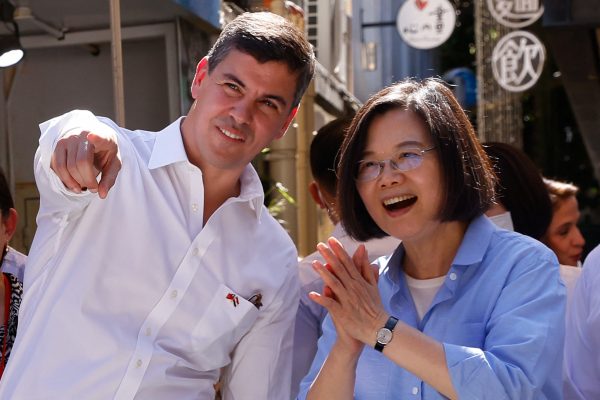Voters expressed their desire for continuity above all else and this extends to Paraguay’s foreign policy, certain points of which have remained unchanged over time. This includes the guiding principle of state sovereignty — so that Paraguay can ensure its own survival as a small landlocked country neighbouring two regional powers, Brazil and Argentina. Asuncion also defends its position in the world through participation in multilateral organisations, regional integration and by maintaining relations with strategic partners. These include Brazil, Argentina, the Southern Common Market, the United States as regional hegemon and a particular relationship with Taiwan.
Thirteen countries recognise Taiwan instead of the People’s Republic of China and Paraguay has been one of the most loyal in this regard. Taiwan–Paraguay bilateral relations have been constant since the signing of the Agreement for the Establishment of Diplomatic Relations in July 1957, while Paraguay represents Taiwan’s last diplomatic link with the South American region. Domestic political stability has been a key factor enabling the continuity of this link and the triumph of the Colorado Party in 2023 strongly suggests more of the same.
But the international context and domestic conditions in Paraguay are not the same as they were decades ago — a key point for analysing future scenarios.
From the outset, President-elect Pena stated he would not change the diplomatic recognition of Taiwan, endorsing Taipei as a strategic partner. This coincides with the historical guidelines of the Colorado Party, with which the Taiwanese government has maintained good relations for decades. This link between the political elites is the main reason for maintaining the relationship. The other reason is bilateral cooperation at the financial and technical level, though it has less and less weight due to the incursion of China in the region and its large infrastructure and credit projects with which Taiwan cannot compete.
On the other hand, the growing influence of the United States and its pressing interest in Paraguay’s continued relations with Taiwan in the context of heightened tensions in the Taiwan Strait cannot be overlooked. Relations with Taiwan have become an increasingly strategic element in Paraguay’s bilateral agenda with the United States.
The US State Department’s 2022 Integrated Country Strategy for Paraguay establishes as a priority the strengthening of support mechanisms for Paraguay to prevent the incursion of foreign non-liberal actors such as China. The importance of this strategic alliance can also be clearly seen from the increase in bilateral diplomatic meetings between the United States and Taiwanese embassies and the trilateral meetings between Paraguay, Taiwan and the United States.
Nonetheless, some economic sectors in Paraguay find it difficult to ignore China’s enormous market potential — particularly as prying open new markets and boosting exports support Asuncion’s foreign policy. Though Paraguayan products enter China, this happens by means of trade triangulation through neighbouring countries, which reduces profits and complicates logistics. At the same time, China is Paraguay’s main import market, registering 29.6 per cent of imports in 2022.
This equation creates a negative trade balance for Paraguay that commercial volumes with Taiwan cannot make up. Though Taiwan has made timid efforts to expand imports of Paraguayan products, the agricultural and livestock sectors are dissatisfied with the export quotas offered by Taiwan, reaching only 2.2 per cent of total trade in 2022.
While this marks a substantial increase from over a decade ago — Taiwan’s total share in Paraguayan trade was a mere 0.2 per cent in 2014 — the Latin American country seeks better returns on trade and investment from their Taiwanese partners, who have responded favorably despite the timid progress. Negotiations in this space demonstrate one of the qualities of the Paraguay–Taiwan link most applauded by its advocates — the possibility of maintaining a level of communication ‘between equals’, as opposed to the fear of dealing with a severely asymmetrical relationship with China.
Beyond trade, Taiwan focuses diplomatic resources on maintaining technical cooperation projects in Paraguay in aquaculture, floriculture, support for small- and mid-sized enterprises, women’s empowerment and the training of health professionals. There are also frequent financial and material donations to public institutions, mainly in the areas of technology and mobility. Bilateral cooperation also includes housing projects, educational scholarship programs and the creation of the Taiwan–Paraguay Polytechnic University, which are very well accepted by Paraguayan society.
As Santiago Pena prepares to begin his presidency, influential political figures in Paraguay have promoted expanding dialogue with China to foster market access. But it seems Pena will not accept conditions that alter the recognition of Taiwan. So far, China has promoted a low-profile policy of rapprochement, maintaining communications with business sectors and floating the possibility of infrastructure investment. Beijing appears content to wait for internal factors to turn in its favor. China will wait and see if such opportunities present themselves under Paraguay’s new president.
Julieta Heduvan is a Masters student in Latin American Studies at the University of Salamanca.

